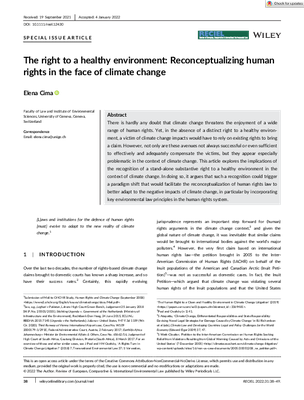The Right to a Healthy Environment: Reconceptualizing Human Rights in the Face of Climate Change
There is hardly any doubt that climate change threatens the enjoyment of a wide range of human rights. Yet, in the absence of a distinct right to a healthy environment, a victim of climate change impacts would have to rely on existing rights to bring a claim. However, not only are these avenues not always successful or even sufficient to effectively and adequately compensate the victims, but they appear especially problematic in the context of climate change. This article explores the implications of the recognition of a stand-alone substantive right to a healthy environment in the context of climate change. In doing so, it argues that such a recognition could trigger a paradigm shift that would facilitate the reconceptualization of human rights law to better adapt to the negative impacts of climate change, in particular by incorporating key environmental law principles in the human rights system.
https://biodiversitylinks.org/learning-evidence/one-health-evidence/one-health-evidence-inbox/cima-2017_the-right-to-a-healthy-environment-reconceptualizing-human-rights-in-the-face-of-climate-change.pdf/view
https://biodiversitylinks.org/learning-evidence/one-health-evidence/one-health-evidence-inbox/cima-2017_the-right-to-a-healthy-environment-reconceptualizing-human-rights-in-the-face-of-climate-change.pdf/@@download/image/image.png
File
The Right to a Healthy Environment: Reconceptualizing Human Rights in the Face of Climate Change
There is hardly any doubt that climate change threatens the enjoyment of a wide range of human rights. Yet, in the absence of a distinct right to a healthy environment, a victim of climate change impacts would have to rely on existing rights to bring a claim. However, not only are these avenues not always successful or even sufficient to effectively and adequately compensate the victims, but they appear especially problematic in the context of climate change. This article explores the implications of the recognition of a stand-alone substantive right to a healthy environment in the context of climate change. In doing so, it argues that such a recognition could trigger a paradigm shift that would facilitate the reconceptualization of human rights law to better adapt to the negative impacts of climate change, in particular by incorporating key environmental law principles in the human rights system.



